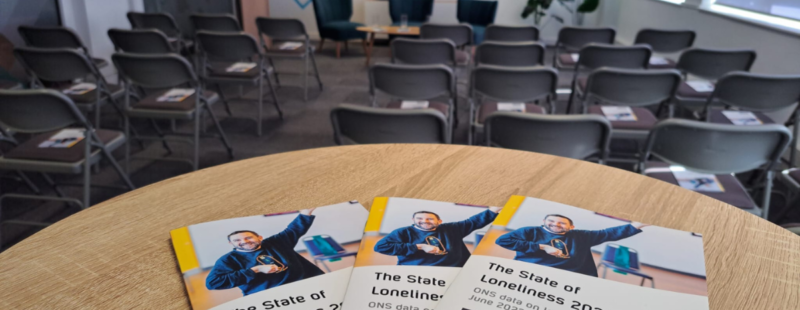What lies ahead for the next five years of loneliness?
On Wednesday 21 June, we brought together a community of passionate individuals and key thinkers to discuss how we can address loneliness in the next five years. The event was chaired by Sarah O’ Grady, Social Affairs Correspondent of the Daily Express, with panellists Noreena Hertz, author of The Lonely Century, and Kate Jopling, Independent Consultant.
Thank you to everyone who joined us in person and online, and to our event sponsors Sky and Togetherly.
Access the audio recording of the event:
New analysis of ONS data on loneliness
To provide context to the discussion, Robin Hewings shared research findings from our latest analysis of ONS loneliness data. The findings revealed some expected trends, such as younger people reporting higher levels of loneliness, but also highlighted emerging disparities between genders and the influence of health conditions on loneliness. Notably, the data indicated an upward trend in chronic loneliness following the pandemic.
“Loneliness does not exist in a vacuum”
Noreena Hertz explored the root causes and structural drivers of loneliness, citing the decline of community infrastructure, the negative impact of social media on mental health, and the economic factors that contribute to loneliness.
Noreena urged the regulation of social media, advocating for economic support to address loneliness, as it affects both physical and mental health, as well as productivity.
Overcoming the stigma of loneliness
The panel discussed the stigma of addressing loneliness, highlighting that progress had been made in raising awareness about the prevalence of loneliness.
Open conversations about loneliness that consider diverse experiences and provide appropriate, individualised support are crucial. This is particularly important given the practical challenges related to loneliness, such as transportation barriers and economic constraints.
Breaking down the stigma further requires acknowledging and addressing the discomfort people may feel when discussing loneliness.
Multifaceted approaches to revitalise communities
Multifaceted approaches that involve government, businesses and communities are key to addressing loneliness.
Initiatives focused on revitalising local communities, such as affordable social activities, can help to create supportive environments but there is also a need for action on larger issues like transportation, the built environment, and social care.
While recognising the negative impact of technology on loneliness, there is also a positive role it can play in connecting marginalised groups and providing crucial support for people.
Reflecting on the past five years and looking forward
Kate Jopling reflected on the past five years of the loneliness strategy and explored potential directions for the future. The significance of a national strategy for loneliness in 2018 was a bold step that laid the foundations for addressing loneliness.
As we look forward to the next five years, we need to view loneliness as a unifying cause that speaks to our shared humanity and warrants pride and commitment in addressing it.
Kate encouraged us to embrace the loneliness agenda as a comprehensive and vital effort that requires action and support across all parts of society, enabling us to rebuild the community fabric.
Share your views: refreshing our call to action on loneliness
This event marks the starting point for taking action on loneliness and driving progress for change over the next five years.
What do you think should be the key priorities for action on loneliness over the next five years? Share your views.
The survey will remain open until 9am on Monday 10 July.





No comments on this article yet. Please feel free to submit a comment below.
By submitting a comment you grant Campaign to End Loneliness a perpetual license to reproduce your words and name/web site in attribution. Inappropriate and irrelevant comments will be removed at an admin's discretion. Your email is used for verification purposes only, it will never be shared.